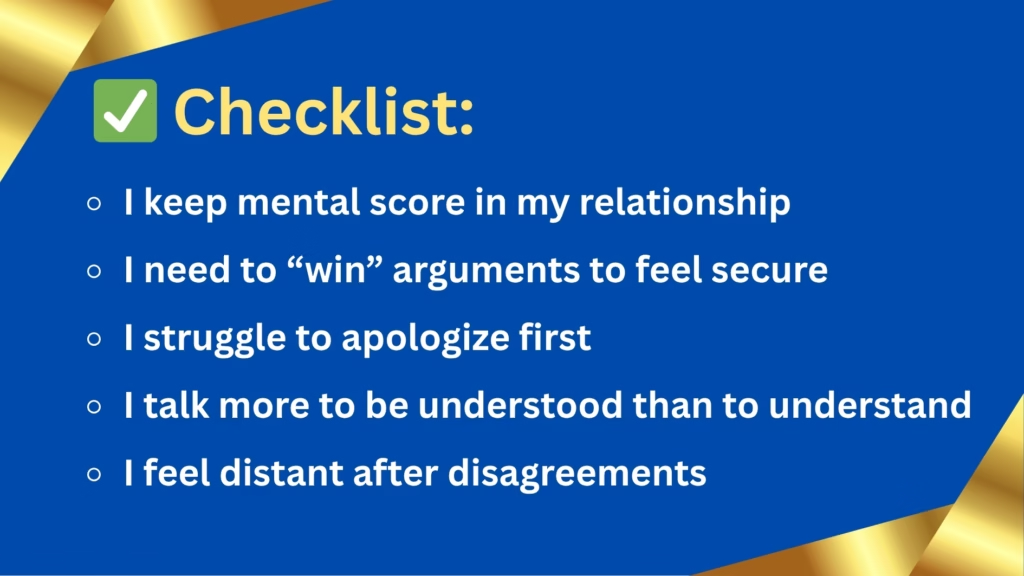Moving beyond right and wrong in relationships is more than a mindset—it’s a survival skill for contemporary love. It’s simple to slip into the trap of proving a point rather than maintaining a relationship in today’s age of rapid responses and high expectations. This article delves deeply into what it means to exchange the legal battle for a caring relationship. This guide is a wake-up call to stop keeping score and begin healing together, supported by research, real-life stories, professional insights, and emotionally intelligent tools.

💔 Why We Need to Move Beyond “Right vs. Wrong”
🤯 The Blame Game: A Relationship Killer
Let’s face it, being correct feels fantastic. However, that small victory frequently has a huge price in relationships: emotional exhaustion, bitterness, and alienation.
Real-Life Example:
Lana kept score every time Chris left dishes in the sink. She wanted an apology. Chris wanted appreciation. Arguments flared up like clockwork, neither willing to budge. Months passed. Connection died. What started as a dirty-dishes disagreement turned into emotional detachment.
The problem? Both were too caught up in being right, and forgot to be close.
🧠 The Psychology Behind the Conflict
🧒 The Adaptive Child vs. The Wise Adult
Renowned therapist Terry Real introduced the idea of the “Adaptive Child”—the part of us that developed survival strategies in childhood. When triggered, we snap back to that version of ourselves: defensive, self-protective, and emotionally reactive.
| Version of Self | Key Traits |
|---|---|
| Adaptive Child | Blaming, controlling, emotionally avoidant |
| Wise Adult | Accountable, vulnerable, emotionally mature |
🧠 “The goal isn’t to never get triggered. It’s to recognize when you are—and call in the adult.” — Terry Real, US: Getting Past You & Me to Build a More Loving Relationship
👫 When One Partner Changes, Everything Shifts
🌱 It Only Takes One to Start Healing
Often, couples wait for the other person to take responsibility. But healing begins when even one partner chooses emotional ownership.

Case Study:
Priya, from London, stopped demanding apologies from her fiancé. Instead, she expressed how the lack of emotional response made her feel invisible. To her surprise, he softened. “I never realized you felt that way,” he admitted. That day, the blame game ended.
💬 The Relationship Reframe: From Adversaries to Allies
💖 Speak to Connect, Not to Correct
Instead of saying:
“You never plan anything for me!”
Try:
“I feel unimportant when special days go unnoticed. I miss feeling thought of.”
Why This Works:
-
-
Reduces defensiveness
-
Invites empathy
-
Opens a door to reconnection
-
📣 Reminder: You’re not fighting each other. You’re fighting the disconnection together.
🔍 Recent Research Insights
📊 What Science Says About Conflict and Repair
A 2023 study in the Journal of Marital and Family Therapy found that:
-
Couples who prioritized emotional responsibility over being “right” had 23% higher long-term satisfaction rates.
-
Those who practiced “repair conversations” within 24 hours of a fight were 35% less likely to separate over 5 years.
🧰 Checklist: Are You Stuck in “Right vs. Wrong” Mode?
Use this to assess your current dynamic:

If you checked 3 or more, you may be stuck in adversarial dynamics.
📊 Comparison Table: The Shift From Conflict to Connection
| Old Pattern | New Approach |
|---|---|
| “Who’s right?” | “How do we reconnect?” |
| Blame | Accountability |
| Emotional shutdown | Vulnerable expression |
| Power struggle | Collaborative repair |
| Passive aggression | Clear, kind communication |
📌 7 Practical Ways to Move Beyond Right and Wrong
1. Use “I feel” Instead of “You never”
-
-
-
Makes your partner less defensive
-
-
2. Pause Before Reacting
-
-
-
Breathe. Then respond from your adult self.
-
-
3. Validate Without Agreeing
-
-
-
“I see this matters to you” goes a long way.
-
-
4. Take 10% Ownership
-
-
-
Even a small acknowledgment can shift the mood.
-
-
5. Practice Daily Appreciation
-
-
-
Connection thrives on being seen and valued.
-
-
6. Schedule Repair Rituals
-
-
-
A 10-minute check-in every night saves hours of fighting.
-
-
7. Learn Your Partner’s Triggers
-
-
-
Avoid landmines by understanding old wounds.
-
-
🎙️ Expert Insight
Interview Snippet: Dr. Lori Gottlieb, therapist and NYT bestselling author:
“The most connected couples I see in therapy aren’t the ones who never fight. They’re the ones who repair quickly, take accountability, and stay curious about each other.”
Check out her TED Talk: How Changing Your Story Can Change Your Life
🌍 Real-Life Voices from Around the World
-
🇺🇸 “We stopped trying to be right. We started trying to stay close.” – James, Dallas
-
🇦🇺 “I owned my overreactions, and my wife softened instantly.” – Olivia, Sydney
-
🇬🇧 “Accountability changed everything for us. One step at a time.” – Marcus, Manchester
💬 10 FAQs About Moving Beyond Right and Wrong in Relationships
❓ How can I stop blaming my partner?
👉 Start by noticing your internal dialogue. Shift from “they did this” to “what am I feeling and needing?”
❓ What if my partner refuses to take responsibility?
👉 Model the behavior first. It often invites reciprocal vulnerability.
❓ Is apologizing the same as accepting blame?
👉 No. It’s about acknowledging hurt, not assigning guilt.
❓ Can therapy help with this?
👉 Absolutely. Look into relational life therapy (Terry Real’s method).
❓ What if we always fight over the same thing?
👉 You’re probably triggering each other’s deeper emotional wounds. Get curious about what’s under the surface.
❓ How can I bring this up without starting a fight?
👉 Start with “I” statements and a calm tone. Express desire for deeper connection, not correction.
❓ What’s a good daily habit to improve emotional connection?
👉 3 things: Daily appreciation, scheduled check-ins, and active listening.
❓ Should I forgive easily?
👉 Forgiveness is a process. Start with understanding and empathy—it makes forgiveness easier.
❓ How can I stay calm when I’m triggered?
👉 Pause. Breathe. Delay your response. Then speak from your Wise Adult.
❓ Is moving beyond right and wrong the same as letting someone walk over you?
👉 No. It’s about maintaining boundaries with compassion, not submission.
💡 Final Thoughts
Giving up your voice to move past right and wrong in relationships is not the same as choosing peace over pride or connection over control. Love turns into the safe haven it was intended to be when we cease fighting and begin fighting for one another.
🧠 Expert Advice Just for You
If you find yourself in a loop of blame or withdrawal, ask yourself:
“Do I want to be right… or do I want to be close?”
Let that question guide your next words. It might just save your relationship.
🙌 Call to Action
💬 Want to learn how to build deeper connection with your partner every day?
👉 Subscribe to our newsletter for weekly tips, real-life tools, and interviews with top relationship therapists!
Useful Articles :-
- Signs of Love Bombing: 7 Red Flags to Spot Manipulative Affection Early
- What Is a Situationship? 7 Unfiltered Truths About Modern Love
- 10 Signs of a Healthy Relationship: What To Look For
- Communication Skills for Couples: 7 Transformative Tips to Strengthen Your Connection
- 7 Powerful Ways to Build Healthy Relationship Boundaries for Lasting Love
- 9 Empowering Steps for Recovering from a Breakup: Heal, Grow, and Thrive
- 7 Powerful Long-Distance Relationship Advice : Tips to Keep the Spark Alive
- Jealousy in Relationships: 7 Powerful Ways to Manage the Green-Eyed Monster
- 5 Insights Into Love Languages in Relationships : Do They Really Work?
- What Does Emotional Safety In Relationships? 7 Biblical Keys to Building Trust and Intimacy